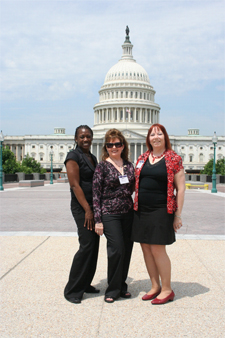Web Exclusive |
Transcription Associations Lobby for Practical Definition of “Meaningful Use”
By Dale Kivi, MBA
 We came, we talked, and more than 100 U.S. senators and congressmen listened.
We came, we talked, and more than 100 U.S. senators and congressmen listened.
Representing more than 300,000 practitioners and 1,700 service organizations, the Association for Healthcare Documentation Integrity (AHDI) and the Medical Transcription Industry Association (MTIA) joined together to charge up Capitol Hill earlier this month to lobby members of Congress for meaningful and practical electronic health record (EHR) adoption under the Health Information Technology for Economic and Clinical Health (HITECH) Act of 2009.
Although most healthcare professionals are already aware that the HITECH Act allows for up to $44,000 in total incentives per physician for “meaningful use” of an EHR starting in 2011, many of the specifics of the act are yet to be defined. The transcription industry organizations lobbied to make certain their contributions in creating and ensuring quality in healthcare documentation are not overlooked as the large technology vendors begin to vie for their piece of the estimated $19.2 billion pie.
“Our core message,” noted MTIA President Linda Yaniszewski, “is that our associations embrace things like speech recognition and integrated EMR [electronic medical record] solutions, but those technologies alone are not capable of delivering quality healthcare documentation without the support of trained healthcare documentation specialists. Whether serving as traditional manual transcriptionists, speech recognition editors, or quality managers for documents generated through pretemplated point-and-click systems, our industry’s knowledge workers are an integral part of the healthcare documentation process.”
“Some EHR vendors have already started showing up to try and position their products as potential national standards,” said Congressman Rob Wittman (R-Va.). “But we [members of Congress] realize there are no silver bullets. Support people have to be involved in the process or there will be major problems. Meaningful use of an EMR cannot happen between the software and the physicians alone. Physicians cannot be expected to take on the role of record administrators. They simply won’t do it.”
“The goal of this event was to counter the claim of many EHR vendors that they can eliminate transcription through applied technology” noted Greg Doggett, JD, of AHDI/MTIA government affairs. “We were pleased to find that members of Congress are open to our position and are willing to take into account the role of the documentation specialist when considering health IT legislation.”
For more information, visit http://www.ahdionline.org and click on the Advocacy tab.
— Dale Kivi, MBA, is director of business development for FutureNet.



